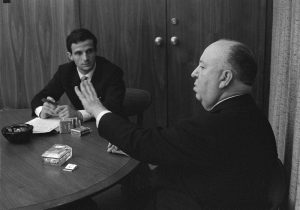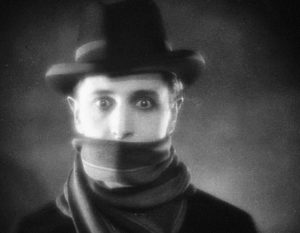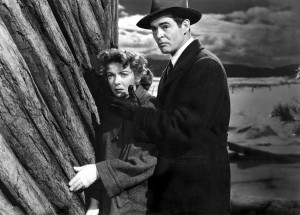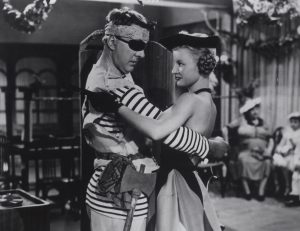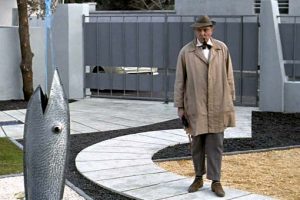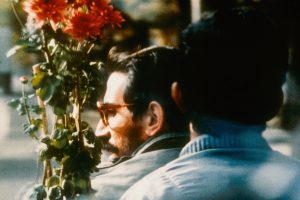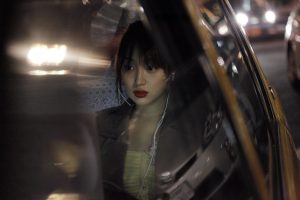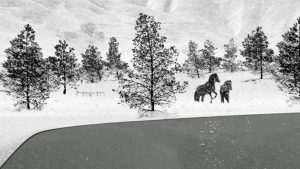HITCHCOCK/TRUFFAUT
Kent Jones (U.S. 2015) 80 min. DCP.
In 1962 Alfred Hitchcock and François Truffaut locked themselves away in Hollywood for a week to excavate the cinematic secrets of mise-en-scène. Based on the original recordings of this meeting — which were used to produce the legendary book Hitchcock/Truffaut (1966) — critic and programmer Kent Jones’ recent film illustrates the greatest cinema lesson of all time, plummeting us into the world of creation around classics such as Psycho and Vertigo. Hitch’s surpassingly modern art is elucidated by today’s leading filmmakers, including Martin Scorsese, David Fincher, Wes Anderson and Paul Schrader.
Friday, August 31 at 2pm
THE LODGER – Digital Restoration!
Alfred Hitchcock (UK 1926) 90 min. DCP. With Ivor Novello, June, Marie Ault. Silent with Live Musical Accompaniment!
Described by the Master himself as “the first true Hitchcock movie,” this thriller is set in a fog-bound London terrorized by a Jack the Ripper-style murderer. His victims, all young blonde women, are discovered each Tuesday night. Matinée idol Novello stars as a mysterious new lodger in a London boarding house. Restoration by the BFI National Archive in association with ITV Studios Global Entertainment, Network Releasing and Park Circus Films.
TOP OF PAGE
Friday, September 7 at 2pm
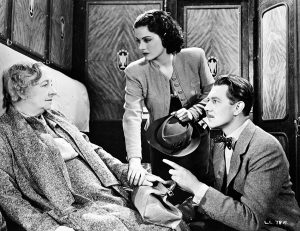
THE LADY VANISHES
Alfred Hitchcock (UK 1938) 96 min. 35MM. With Margaret Lockwood, Michael Redgrave, Paul Lukas.
In Hitchcock’s quick-witted and devilishly comic thriller, the beautiful Margaret Lockwood, traveling across Europe by train, meets a charming spinster, who then seems to disappear into thin air. The younger woman turns investigator and finds herself drawn into a complex web of mystery and high adventure.
TOP OF PAGE
Friday, September 14 at 2pm
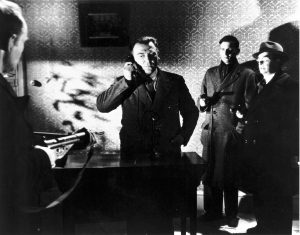
BON VOYAGE and AVENTURE MALGACHE
Alfred Hitchcock (UK 1944) French with English subtitles. 35MM.
Hitchcock returned to Britain to make his contribution to the Allied war effort with two French-language films produced for the British Ministry of Information and intended to encourage resistance in France and, especially, the French colonies. In Bon Voyage (26 min. With the Molière Players), a Scottish air gunner who has escaped from a POW camp in Germany and made it safely back to Britain is interrogated by a Free French Intelligence officer. In Aventure Malgache (31 min.), the French underground resistance in Madagascar is threatened with exposure by the jealous girlfriend of one of the resistance leaders.
Friday, September 21 at 2pm
ON DANGEROUS GROUND
Nicholas Ray (U.S. 1951) 82 min. 35MM. With Ida Lupino, Robert Ryan, Ward Bond, Ed Begley.
Increasingly violent and desensitized to the brutality of his city beat, Robert Ryan’s detective is reassigned to a case in a rural town, far from the mean streets. When a young woman is murdered, her enraged dad (Bond) and the disillusioned cop team up to track down the suspect. Chasing him through a famous sequence of sublime snowy landscapes, they come to a cabin where Mary (Lupino) lives alone in the wilderness, a literal and figurative beacon of hope in a blizzard of despair. Ray’s aesthetic resonates in a transcendent visual tension between the dark, claustrophobic downtown and the bright, barren north.
TOP OF PAGE
Friday, September 28 at 2pm
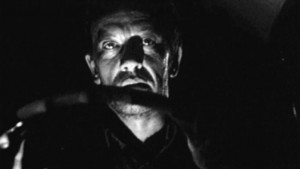
THE HITCH-HIKER
Ida Lupino (U.S. 1953) 71 min. DCP. With Edmond O’Brien, Frank Lovejoy, William Talman.
Two buddies set out for a Baja fishing trip, pick up the titular hitchhiker and quickly become his captives. Ida Lupino, an A-list Hollywood actress, pioneering filmmaker and the only woman to direct an American film noir, sets her thriller in the harsh Mexican landscape. There she stages the terrorization of two ordinary, middle-class businessmen by a maniacal serial killer – a twisted embodiment of anarchic masculinity and uncontrollable psychotic rage.
MONSIEUR HULOT’S HOLIDAY
Jacques Tati (France 1953) 87 min. DCP. With Jacques Tati, Nathalie Pascaud, Micheline Rolla. French with English subtitles.
Though he made only a handful of films, director, writer and actor Jacques Tati ranks among the most beloved of all cinematic geniuses. In Monsieur Hulot, Tati’s endearing clown takes a holiday at a seaside resort, where his presence provokes one catastrophe after another. The film’s showcase of gentle slapstick is a series of effortlessly well-choreographed sight gags involving dogs, boats and firecrackers; it was the first entry in the Hulot series and the film that launched its maker to international stardom.
TOP OF PAGE
MON ONCLE
Jacques Tati (France 1958) 116 min. DCP. With Jacques Tati, Jean-Pierre Zola, Adrienne Servantie. French with English subtitles.
Slapstick prevails again when Tati’s eccentric, old-fashioned hero Monsieur Hulot is set loose in Villa Arpel (the geometric, oppressively ultramodern home of his brother-in-law), and in the antiseptic plastic hose factory where he gets a job. The second Hulot movie and Tati’s first color film, Mon oncle is a supremely amusing satire of mechanized living and consumer society that earned the director the Academy Award for best foreign-language film.
PLAYTIME
Jacques Tati (France 1967) 116 min. DCP. With Jacques Tati, Barbara Dennek, Rita Maiden. French and German with English subtitles.
Tati’s gloriously choreographed, nearly wordless comedies about confusion in an age of high technology reached their apotheosis with Playtime. For this monumental achievement, a nearly three-year-long, bank-breaking production, Tati again thrust the lovably old-fashioned Monsieur Hulot, along with a host of other lost souls, into a baffling modern world, this time Paris. With every inch of its super-wide frame crammed with hilarity and inventiveness, Playtime is a lasting record of a modern era tiptoeing on the edge of oblivion.
CLOSE-UP
Abbas Kiarostami (Iran 1990) 98 min. 35MM. With Hossain Sabzian, Mohsen Makhmalbaf, Abolfazl Ahankhah. Persian with English subtitles.
Internationally revered Iranian filmmaker Abbas Kiarostami has created some of the most inventive and transcendent cinema of the past thirty years, and Close-up is his most radical, brilliant work. This fiction-documentary hybrid uses a sensational real-life event — the arrest of a young man on charges that he fraudulently impersonated the well-known filmmaker Mohsen Makhmalbaf — as the basis for a stunning, multilayered investigation into movies, identity, artistic creation, and existence, in which the real people from the case play themselves. Close-up’s universal themes and fascinating narrative knots have resonated with viewers around the world.
LIKE SOMEONE IN LOVE
Abbas Kiarostami (Japan/France 2012) 109 min. DCP. With Rin Takanashi, Tadashi Okuno, Ryo Kase. Japanese with English subtitles.
After his Tuscany-set Certified Copy (2010), Kiarostami traveled even further afield from his native Iran for this mysterious romantic drama filmed entirely in Japan. Revolving around the brief encounter between a sociology student (Takanashi) who moonlights as a high-end escort and an elderly professor who is more interested in cooking and listening to music than sex (stage actor Okuno, here playing his first leading film role), Like Someone in Love – as is usual in Kiarostami – proposes a meeting in which nothing is quite as it appears on the surface. Is this love, or merely something like it?
24 FRAMES
Abbas Kiarostami (Iran/France 2017) DCP. 114 min.
For what would prove to be his final film, Abbas Kiarostami gave himself a challenge: to create a dialogue between his work as a filmmaker and his work as a photographer, bridging the two art forms to which he had dedicated his life. Setting out to reconstruct the moments immediately before and after a photograph is taken, Kiarostami selected twenty-four still images — most of them stark landscapes inhabited only by foraging birds and other wildlife — and digitally animated them into subtly evolving four-and-a-half-minute vignettes, creating a series of poignant studies in movement, perception and time. A sustained meditation on the process of image making, 24 Frames is a graceful and elegiac farewell from one of the giants of world cinema.
